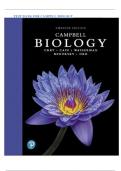Exam (elaborations)
Test Bank for Campbell Biology 12th Edition by Urry, Cain, Wasserman, Minorsky Orr|9780135988046| All Chapters 1-56| LATEST
- Course
- Institution
- Book
Test Bank for Campbell Biology 12th Edition by Urry, Cain, Wasserman, Minorsky Orr| 9780135988046| All Chapters 1-56| LATEST
[Show more]



